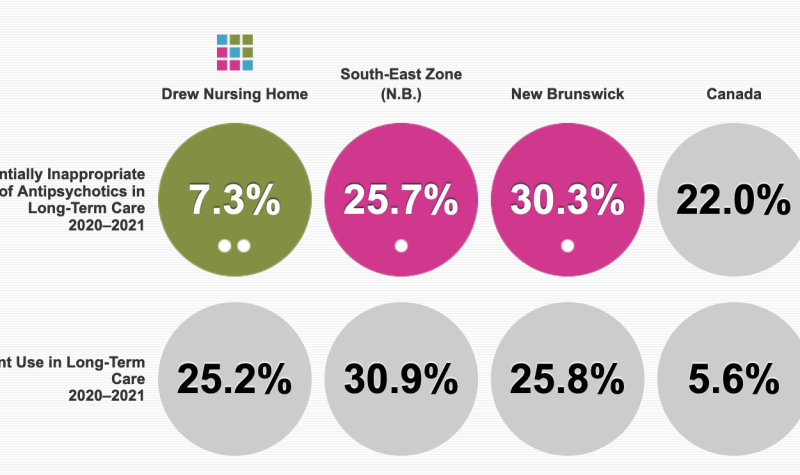New Brunswick nursing homes have the third highest use of antipsychotics deemed “potentially inappropriate” compared to their provincial counterparts, according to research done by the Canadian Institute of Health Information (CIHI). But a Sackville nursing home stands out for its low “potentially inappropriate” use of the drugs.
CIHI looked into how many people living in long term care homes were taking antipsychotic drugs without a diagnosis of psychosis. Antipsychotics are sometimes used to help control patients with behavioural challenges brought on by conditions like dementia. But those uses can pose added risks, such as an increase in falls, says Drew Nursing Home director Linda Shannon.
“Use of antipsychotics for dementia is what normally is not appropriate,” says Shannon. “It’s not a good use of an antipsychotic.”
CIHI found rates of potentially inappropriate use in New Brunswick ranging from 71.4% at Villa St-Joseph in Tracadie, to 7.3 per cent at the Drew Nursing Home in Sackville. The average rate in New Brunswick was 30.3 per cent, above the national average of 22 per cent.
Shannon says the reason for the low rate of inappropriate use at the Drew could have something to do with the resources in the nursing home, which accommodates up to 118 residents.
“The big reason that our use of antipsychotic is low at the Drew is because we have a nurse practitioner here four and a half days a week,” says Shannon. “Our nurse practitioner evaluates every resident as they come in, sometimes they may not be on an appropriate use of an antipsychotic. And at that point, she would look at their medications and adjust accordingly.”
Shannon says the Drew’s doctor, who visits the home one day a week, is also very involved in medications for resident patients.
“We have a very progressive physician in that field,” says Shannon.
The Drew has been lucky to have a nurse practitioner for about 11 years, says Shannon. Not all nursing homes have one. “We applied for the position and we were fortunate to have got [it],” says Shannon.
Listen to the CHMA story below:


